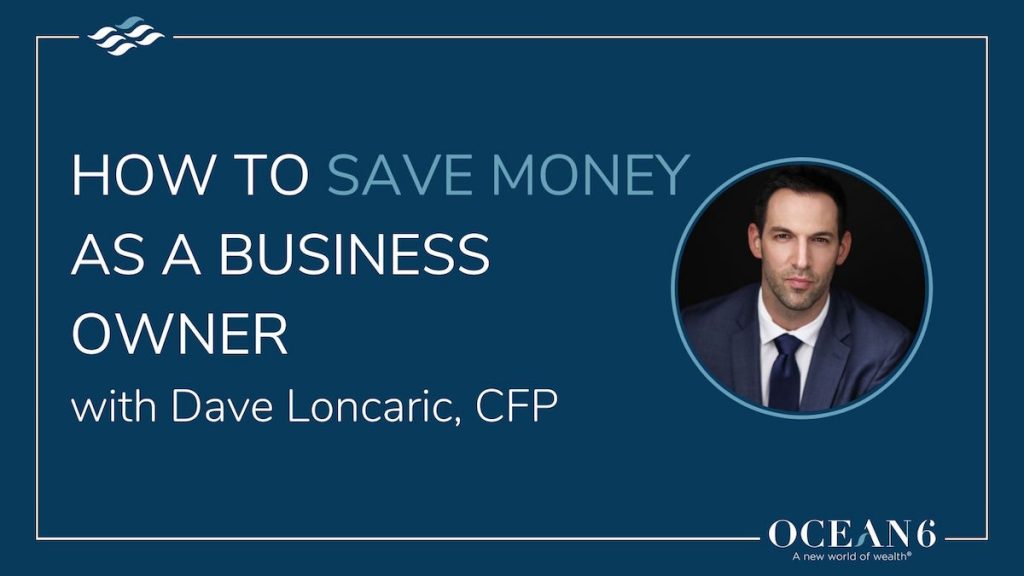Financial goal setting is at the foundation of everything we do at Ocean 6. Every day we see the power of goal-setting as more and more clients achieve their biggest financial goals.
When we say goal setting, we aren’t just talking about ideas that have crossed your mind or things that would be “nice to have.” We are talking about getting incredibly specific about what financial success means to you and defining clear, actionable steps to get there.
In this post, we will cover everything you need to know about financial goal setting, including why it matters, how it helps you save, and how a financial planning specialist can help you achieve these goals.
Why You Need Clear Financial Goals
We already mentioned that your financial goals need to be specific, more specific than “make more money.”
As we explain in this blog post, “Maybe you’re thinking “make more money” IS a goal. You’re not wrong, but this goal needs context. First, you need to understand why you want to make more money; what is it going toward?
After all, “financial freedom” is different for everyone. For some, it means not living paycheck to paycheck. For others, it could mean the flexibility to travel whenever and wherever, to own a boat, a vacation home; you name it. But, unfortunately, too many people aren’t sure what it would take to achieve these goals.”
The thing is, if you don’t know where you’re going, you can’t know how to get there! The first step of financial goal setting involves understanding your goals right from the start.
Here’s how to begin:
“Pick an age in the future when you want to have accomplished complete financial freedom and start to picture:
- Where do you live?
- What do you do in your free time?
- What do your surroundings look like?
Get clear on where you are going, what your goals are, and what you are excited about accomplishing in your life. This goal setting and visualization exercise is a great start: The Future You Visualization & Goals Planner.”
Read more about understanding your financial goals in this article.
Using Your Financial Goals to Save Money
Once you’re clear on your goals, it’s time to start using them as your motivation to save money.
In “How to Save Money as a Business Owner“, we use a diet analogy to explain how a goal-focussed approach to saving will get you more success:
“Similar to how people attempt diets and fail time and time again because they don’t have clearly defined goals, it is the everyday choices you make that will help you reach your financial goals.To the diet analogy: unhealthy snacking is often overlooked. But when it’s done regularly? These little snacks throughout the day add up quickly. They hinder progress toward your goals.
Often the problem is these goals aren’t entirely clear in the first place. Let’s say your overarching goal is to lose weight. To reach that goal, you should make smaller, actionable goals, like eating a healthy dinner five nights a week. With a plan of action clearly defined, you’re a lot less likely to order take-out five nights a week for dinner. Say your goals aren’t as well-defined and you’re just planning to “eat healthier dinners more often,” it’s easy to find yourself indulging more often.
The same goes for your financials. If you’re spending frivolously throughout the month, you won’t have enough to put toward your big-picture goals. Unless these financial goals have been thoughtfully structured, you’re a lot less likely to reach them. On the other hand, if you’re deeply connected to your goals, you’ll focus on things that will get you there.”
Once you understand your goals and begin using them to save money, you’ll start to experience true joy from fulfilling dreams you have intentionally worked towards.
How Financial Goal Setting Can Make Your Life Better
Financial goal setting is a great way to get closer to that elusive “work-life balance.” For example, if you always feel like you don’t have enough money or need to earn more, how can you ever take breaks or get running your business off your mind? On the other hand, if you know your financial goals are clearly defined and you’re working toward them, you’ll have the peace of mind that it’s okay to loosen the grips on your business and enjoy more balance.
Take a look at this client story we cover in our post “How to Use Financial Goal Setting to Fix Your Work-Life Balance“:
“Recently, one of our clients told us she was working 60 hours a week. She was successful but had no time to focus on anything else.
We took her through the goal-setting process as the first step to creating a financial plan. It turned out she ALSO wanted to focus on her health, time for her family, friends, and that two-month trip to Australia she always wanted to take.
When we made sure her money was allocated with those goals in mind, she was reminded not to just concentrate on one area of her life (in this case, work) but to ensure she had the time and resources to enjoy other passions, too.”
Financial Goal Setting with Your Spouse
One of the roadblocks some of our clients come up against with financial goal-setting is sharing their goals with their spouses.
How to Talk to Your Spouse About Your Financial Future? It begins by making space for two-way sharing when it comes to financial goal setting:
“Have you created space for your loved ones to share with you their financial goals?
Our goal-setting visualization is an exercise to expedite your dream life together with your loved ones. With couples, we recommend doing the visualization separately and coming back together to discuss their goals. You’ll find that a lot of the goals overlap, but some are more personal. When we create this open communication with our loved ones, we get the support that we need to build a successful life together faster.
As cheesy as it sounds, consider this acronym for TEAM: Together Everyone Achieves More. When we communicate with one another and work together toward a brighter financial future, everyone wins.”
Hiring a Financial Planning Specialist To Help With Your Goals
Hiring a financial planning specialist is one of the best steps you can take toward reaching your financial goals. Not only will they help with the initial financial goal-setting process, but they will show you how to make your goals achievable and keep you on track.
And it’s never too late to decide to hire a financial planner! As we explain in this post:
“The best time to hire a financial planner is now. It doesn’t matter which stage you’re at in growing your business, a great financial planner will help identify what your future self looks like and where you’re trying to go. Only when you get clarity on what your dream life looks like can you decide how you’re going to get there.”
But just as important as hiring a financial planner in the first place is hiring the right financial planner for you and your specific goals:
“The problem is whether it’s life insurance or a mutual fund, the advice you’re going to get will be biased toward that person’s specialism or expertise. An insurance advisor might take you down the life insurance route, an investment advisor will promote big returns, but unless you have a plan that considers your full financial picture and long-term goals, you’re not going to get the most from your wealth.”
To help ensure you are finding the right financial advisor, there are several questions you should be asking. We cover them in detail in this post, but they include:
- What tax-saving opportunities can I pursue?
- Am I on track with the goals I have set for myself?
- Am I using my corporation effectively to build a tax-efficient retirement plan? (Find out more about this here)
- When should I adjust my investing strategy as a business owners?
- How will my current investments affect me come tax time?
- As a business owner, how can I take advantage of my corporate tax structure? (We talk more about this here)
Remember, you don’t have to go through the financial goal-setting process on your own. The experienced and professional team at Ocean 6 is here to help you create a brighter financial future, one goal at a time.
Book a call, and let’s get started.
Did you learn a lot about financial goal setting in this post? Here are three more posts for you to read next:
Cash Flow Management Tips Business Owners Can’t Afford to Miss
How to Save Money as a Business Owner
The People You Need on Your Financial Team











